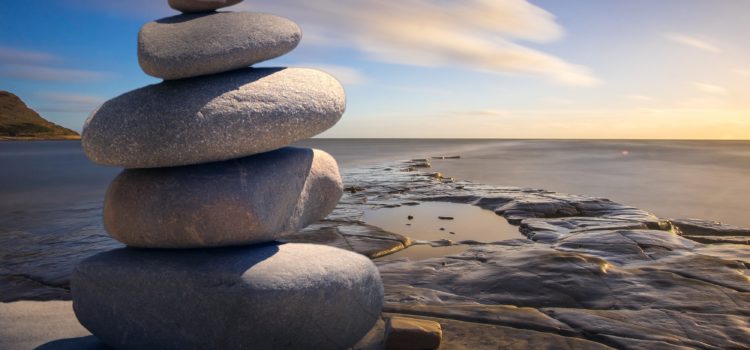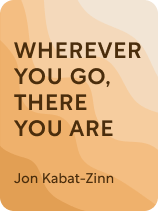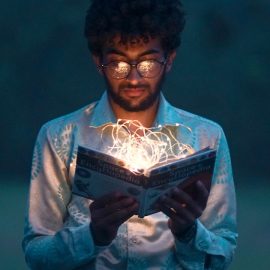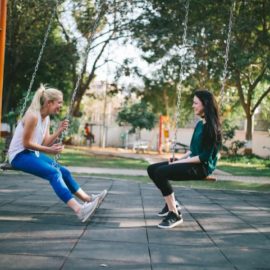

This article is an excerpt from the Shortform book guide to "Wherever You Go, There You Are" by Jon Kabat-Zinn. Shortform has the world's best summaries and analyses of books you should be reading.
Like this article? Sign up for a free trial here.
Why is mindfulness important? What does mindfulness help you connect with?
In Wherever You Go, There You Are, Jon Kabat-Zinn argues that cultivating a mindfulness practice is worthwhile. It’ll allow you to live a richer life, know yourself better, make more intentional choices, and appreciate your connection to something larger than yourself.
Let’s dive into the importance of mindfulness and how it can positively affect your life.
1. Experience the World More Fully
Why is mindfulness important for you to live a richer and more vibrant life? Our experience of the world is often filtered through the stories we tell ourselves about our experiences. In this way, our thoughts, assumptions, and perceptions of reality distort our experience of the world. For example, if it’s raining, you might feel annoyed that you forgot your raincoat or worried that traffic will be worse, but when you practice mindfulness, you’ll instead notice how the rain feels or sounds as it falls.
(Shortform note: Mindfulness also makes your life richer by increasing your subjective well-being. Scientific research suggests that mindfulness makes people happier. Trait mindfulness, also known as dispositional mindfulness, has been associated with higher levels of life satisfaction, self-esteem, empathy, and optimism. Studies have also found that a consistent mindfulness practice can lead to increased subjective well-being, decreased stress, and improved behavioral and emotional regulation.)
Second, mindfulness connects us with what we’re experiencing. Most of us spend our days thinking about things disconnected from the current moment. Usually this means replaying things that have happened in the past or planning for the future. Kabat-Zinn argues that the current moment is the only thing that’s real—therefore, if we spend our lives too distracted to notice what’s right in front of us, then it’s like we’re living half-asleep, letting our lives pass us by unnoticed and unappreciated and never experiencing the full beauty and complexity of the world directly.
(Shortform note: There’s a good reason most people spend their time thinking about the past or worried about the future. Human survival has depended on our ability to learn from past experiences and plan for the future, so our brains are hardwired to focus on what came before and what’s ahead. However, in Why Zebras Don’t Get Ulcers, neurologist Robert Sapolsky explains that human behavior has changed over time, and behaviors that once had an evolutionary benefit may no longer serve us in the modern world.)
2. Know Yourself Better
Mindfulness is also the practice of getting to know yourself better. Many of us suffer from distorted thinking that downplays our strengths and overemphasizes our faults. Mindfulness enables us to cultivate true self-awareness, free from the ongoing internal monologue of self-criticism. Mindfulness doesn’t demand that you improve yourself, only that you see and honor yourself exactly as you are.
(Shortform note: According to Yuval Noah Harari, author of 21 Lessons for the 21st Century, knowing yourself better and, more specifically, knowing how your mind works is the only way to make sense of the world. He explains that your mind determines how you experience, interpret, and react to the world around you, so by observing your mind closely and becoming aware of your own biases, fears, and assumptions, you’ll be able to better distinguish your perception of reality from reality itself.)
Kabat-Zinn explains that mindfulness can also empower you to be the authority on your life, body, and experiences. If you’re fully aware of what you’re thinking and how you’re feeling, then you’ll become a more effective advocate for what’s best for your physical, mental, and emotional health.
(Shortform note: Kabat-Zinn argues that mindfulness leads to self-awareness, which is a necessary step in self-advocacy, but mindfulness isn’t the only tool you can use to build self-awareness. You can also reflect on your long-term goals and priorities, take psychometric tests or personality assessments, talk with close friends about challenges you’re facing, or get regular feedback from mentors and colleagues on your personal and professional growth.)
3. Make Intentional Choices
Being the authority on your life can empower you to take control of your life. Kabat-Zinn explains that people often blame their circumstances for their problems, but he argues that the answers to your problems lie within you. Instead of looking for the answers to your problems elsewhere, Kabat-Zinn argues that mindfulness helps you turn inward, ask questions, and then make informed decisions that help you take intentional steps in the direction you want to go.
(Shortform note: The Oz Principle authors Roger Connors, Tom Smith, and Craig Hickman write that blaming external circumstances for your problems is characteristic of a victim mindset. They argue that personal accountability is the solution to any problem, because accountability will give you control of your own life instead of allowing external forces to take control. They explain that to become more accountable you first need to confront reality, then identify how you contributed to the problem, take responsibility for solving it, and finally take action to address it.)
He adds that without mindfulness, it’s easy to make decisions based on impulse or habit. But in the practice of mindfulness, you observe these impulses arise without acting on them, so when you do make a decision, you do so with awareness and intention. For example, if you’re feeling unhappy at work, it’d be easy to blame annoying colleagues or a negative work culture. Mindfulness practice helps you become more aware of how your own habits and interactions might be contributing to negativity at work, allowing you to make more thoughtful choices that improve your life and the lives of others.
(Shortform note: Developing awareness about your impulses and habits is important because research suggests as much as 90% of your daily decision-making is unconscious. In Thinking, Fast and Slow, psychologist Daniel Kahneman explains our brain has two systems—System 1, which operates automatically with little to no effort; and System 2, which allocates attention to more effortful decision-making. System 2 requires a large input of energy to function, so the majority of our decisions happen unconsciously using System 1.)
4. Connect With Something Larger
Not only does mindfulness help you live your life more intentionally, it also connects you to something larger than yourself. As you cultivate your mindfulness practice, you become aware of how everything is interconnected, how one moment connects to the next, and how many moments had to align to bring you to exactly where you are today. This awareness helps you appreciate the importance of every moment, even as you recognize that each moment is fleeting.
(Shortform note: Recognizing how everything in the world is interconnected can also strengthen your sense of responsibility toward others. In Braiding Sweetgrass, Indigenous ecologist Robin Wall Kimmerer explains that our interconnectedness demands a philosophy of mutual care in which we’re each invested in the well-being of our ecological and human communities. She argues that adopting a philosophy of mutual care is necessary to build a sustainable economy and to ensure the long-term vitality of the Earth.)

———End of Preview———
Like what you just read? Read the rest of the world's best book summary and analysis of Jon Kabat-Zinn's "Wherever You Go, There You Are" at Shortform.
Here's what you'll find in our full Wherever You Go, There You Are summary:
- A guide to mindfulness for both beginners and seasoned practitioners
- How to incorporate mindfulness more intentionally into your daily life
- How to practice mindfulness through meditation






